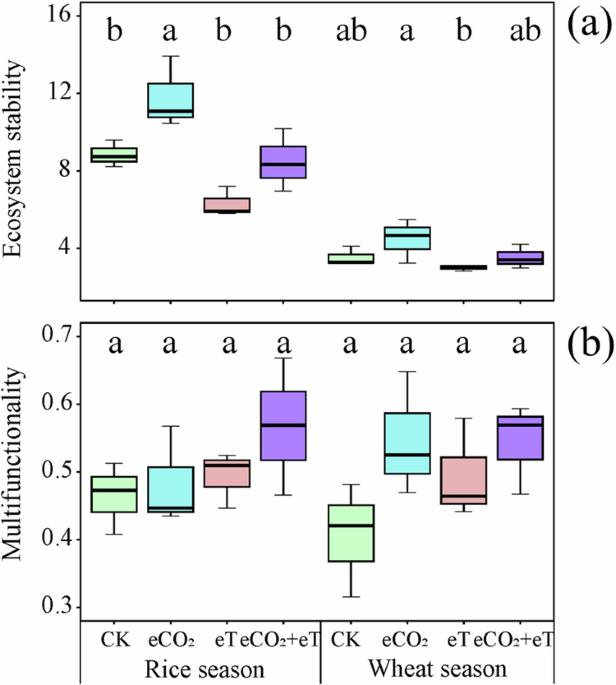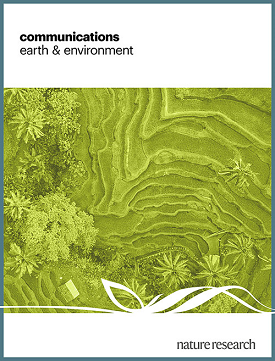在二氧化碳升高和气候变暖的条件下,土壤微生物的生物多样性有助于实现多种生态系统功能
IF 8.1
1区 地球科学
Q1 ENVIRONMENTAL SCIENCES
引用次数: 0
摘要
人们对全球变化下土壤微生物对农业生态系统多功能性的贡献仍然知之甚少。在此,我们根据在水稻-小麦农业生态系统中进行的二氧化碳(CO2)升高和气候变暖的田间试验数据,发现土壤微生物会影响气候变化对农业生态系统功能的影响。在二氧化碳升高的条件下,水稻季的粮食产量稳定性增加,但在气候变暖的条件下,粮食产量稳定性下降,而小麦季的粮食产量稳定性没有显著变化。研究发现,二氧化碳升高和气候变暖对农业生态系统多功能性的交互影响很小。土壤真菌和线虫的丰度分别与稻季和麦季农业生态系统的稳定性相关。土壤古细菌多样性和细菌丰度分别与稻季和麦季的农业生态系统多功能性有关。我们的工作证明了土壤微生物对农业生态系统功能的积极影响,并强调了在气候变化条件下保持微生物多样性对农业生态系统健康的意义。根据中国江苏省稻麦农业生态系统实验的实地数据,在二氧化碳和温度升高的条件下,农业生态系统的稳定性分别与水稻和小麦生长季节土壤真菌和线虫的丰度密切相关。本文章由计算机程序翻译,如有差异,请以英文原文为准。

Soil microbial biodiversity supports the delivery of multiple ecosystem functions under elevated CO2 and warming
The contribution of the soil microbes to agroecosystem multifunctionality under global change remains poorly understood. Here, based on data from a field experiment involving elevated carbon dioxide (CO2) and warming in a rice-wheat agroecosystem, we found that soil microbes influence the impact of climate change on agroecosystem functions. The stability of food production during the rice season increased under elevated CO2 but decreased under warming, with no significant changes in the wheat season. The interactive influences of elevated CO2 and warming on agroecosystem multifunctionality were found to be minimal. The abundance of soil fungi and nematode was associated with agroecosystem stability during the rice and wheat seasons, respectively. Soil archaeal diversity and bacterial abundance were linked to agroecosystem multifunctionality in the rice and wheat seasons, respectively. Our work proves the positive effects of soil microbes on agroecosystem functions and highlights the implications of maintaining microbial diversity for agroecosystem health under climate change. Under elevated CO2 and temperature conditions, agroecosystem stability is closely associated with soil fungal and nematode abundance during the rice and wheat growing season respectively, according to field data from a rice-wheat agroecosystem experiment in Jiangsu Province, China.
求助全文
通过发布文献求助,成功后即可免费获取论文全文。
去求助
来源期刊

Communications Earth & Environment
Earth and Planetary Sciences-General Earth and Planetary Sciences
CiteScore
8.60
自引率
2.50%
发文量
269
审稿时长
26 weeks
期刊介绍:
Communications Earth & Environment is an open access journal from Nature Portfolio publishing high-quality research, reviews and commentary in all areas of the Earth, environmental and planetary sciences. Research papers published by the journal represent significant advances that bring new insight to a specialized area in Earth science, planetary science or environmental science.
Communications Earth & Environment has a 2-year impact factor of 7.9 (2022 Journal Citation Reports®). Articles published in the journal in 2022 were downloaded 1,412,858 times. Median time from submission to the first editorial decision is 8 days.
 求助内容:
求助内容: 应助结果提醒方式:
应助结果提醒方式:


